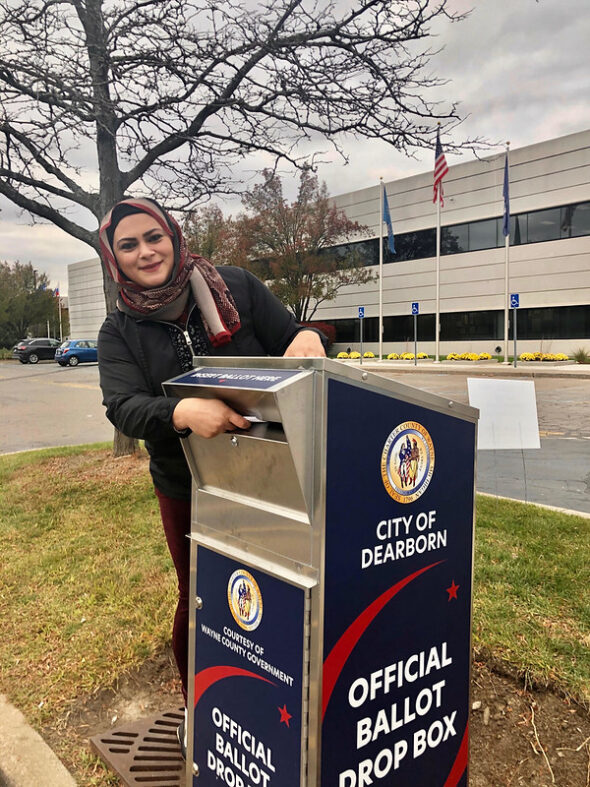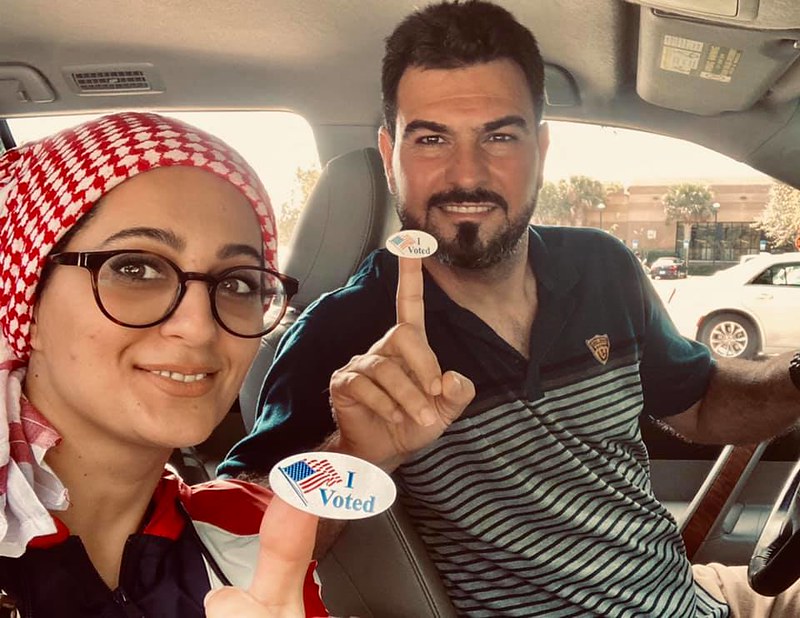Nadia Hussain has had enough of experiencing Muslim Americans being viewed as ‘less American’ because of their religion and ethnic origin. She said when dealing with Trump supporters online, they have been quick to use her ethnic background as a weapon against her.
But Hussain of Bloomingdale, New Jersey will not be deterred by the hate. She said Muslims are just as affected by the issues that plague this country as any other American.
“We live in this country where the economy affects us, big decisions made by our government affect us, just like it would affect any other American person or family,” Hussain said.
With the elections looming, Muslim and Arab American voters across the United States are just as caught up in the stress and drama of the 2020 Presidential Election.
Hussain, like most Americans, is worried about COVID-19.
“There is misinformation on the national level that’s definitely making all our communities less safe, especially communities of color,”said Hussain.
Hussain, is part of the 71% of the Muslim American community that back Biden according to the Council on American-Islamic Relations (CAIR). The poll showed only 18% percent of Muslim voters support Trump.
Despite the support, Hussain holds some reservations about the Democratic Party.
“If the Republican Party is completely fine with being extreme in the other direction, the Democratic Party should be comfortable being bold in their efforts to improve and progress the United States,” she said,
Pollsters say back in the 1990s, Muslim voters were split almost evenly in their support for Republicans and Democrats. But that gap began to widen post 9/11, when the Republican Party was perceived as more hostile to Islam.
And Trump’s presidency began with a Muslim ban.
Executive Order 13769 banned travel from seven predominantly Muslim countries – Iran, Iraq, Libya, Somalia, Sudan, Syria, and Yemen.
Trump again went after, the Muslim and Arab community just a few days ago when he tweeted that his administration has suspended, “the entry of refugees from terror-compromised nations like Syria, Somalia and Yemen.”
My Administration has suspended the entry of refugees from terror-compromised nations such as Syria, Somalia and Yemen. Biden’s plan surges refugees 700% into Minnesota, Michigan & Pennsylvania—burdening schools & hospitals while opening the floodgates to Radical Islamic Terror.
— Donald J. Trump (@realDonaldTrump) October 29, 2020
“I know many Muslims in the community don’t agree that it is a Muslim ban and they call it a refugee ban, but we know that the countries that are on the list are Muslim majority countries,” Basma Alawee, a former refugge and first time voter said.
She hopes that Muslims and Arabs see how much they have in common with other targeted communities.
“I think it’s important for our Muslim and Arab Americans to understand that we are a part of a bigger community and we need to show up and stand in solidarity with others, including the Black community, so they can be there for us when we need them,” Alawee said.
Even though some Muslim Americans may not be thrilled by the candidates they need to choose between, they are serious about change, said Nihad Awad, the National Executive Director at CAIR.
“American Muslims want to get rid of policies and attitudes that harm them and they believe in the alternative,” Awad said. “The alternative is just to be normal. We live in abnormal times and they want it to end.”
In Greenville, South Carolina, Robyn Sadoon, an Irish and French Muslim American voter ,is disturbed by how the United States is viewed by the world under this administration. She said their policies have lost a lot of credibility especially when it comes to Syria, Israel-Palestine, NATO and the refugee crisis.
“I don’t think that any of us would have ever imagined that the president of this nation would be laughed at on the world stage by other world leaders,” Sadoon said. “ Much less be given such a negative and critical welcome as we have seen with massive protests against the arrival of this President in so many of the countries that he visited pre-covid.”
A Palestinian Muslim American of Newark, New Jersey, Wajeeh Abushawish, took a different turn on the presidential election. He said he will be voting for Green Party candidate, Howie Hawkins because his overall point is less money on wars and more money put into American lives.
“I am a believer in voting for the person whose ideals match yours the most,” Abushawish said. “He is not afraid to support Palestine either, which is taboo for some reason in the United States.”
Arab Americans share similar concerns.
“Arab Americans have problems with Biden,” Susan Muaddi Darraj, an Arab American novelist from Maryland said. “But our energy right now needs to go in making sure that Trump doesn’t get reelected. My hope is that after the election, we can return to a respect for facts and data. I also hope we find a way to heal the different communities that have been pitted against each other under this administration.”
According to a poll by the Arab American Institute, 59% of Arab voters say they are casting their ballots for Biden compared to 35% voting to reelect Trump.
Biden wasn’t Alana Bannourah’s, a Palestinian Christian American of California, first choice but she said she will be casting her vote for him since the Democratic Party’s values align with hers.
“I am a registered Democrat and I am definitely voting for Biden, besides the fact that I abhor Trump,” Bannourah said. “I feel like the Democratic Party’s values that match mine are the economy, healthcare, the environment lately and especially immigration.”

Machhadie Assi putting her ballot into the ballot box in Michigan on October 30, 2020. Photo courtesy of Machhadie Assi
If there is one major issue on the minds of all American voters entering November 3, it is post-election violence. Machhadie Assi, a Lebanese Muslim American and a Victim Advocate for Michigan’s Attorney General Office, is frightened at the prospect of how Biden and Trump voters will react because people are emotional going into this election.
“I am actually more concerned about the reaction of people if Biden wins than if Trump wins” Assi said. “Our country has gone through a lot of hate and it’s in a sensitive stage right now. The result of the election will either escalate the division or not and I worry it will.”
But Assi is trying to remain hopeful of what is to come in the next four years.
“I hope we can gain back the respect the world has had for the United States of America under the new administration,” said Assi.


